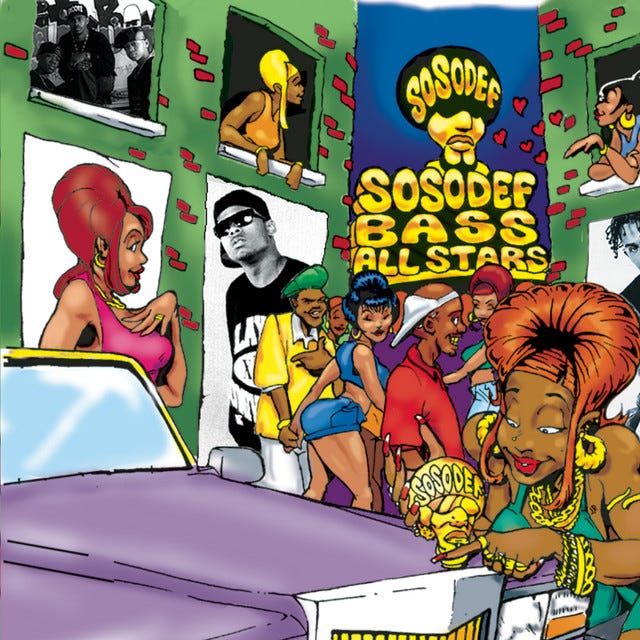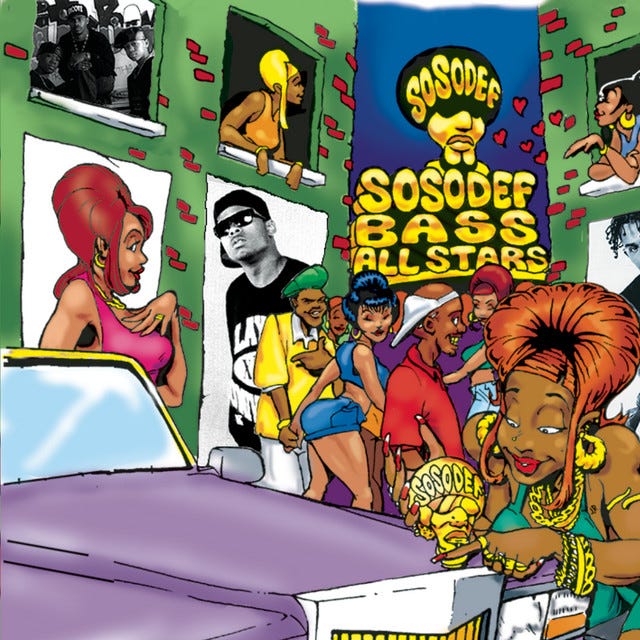With April slowly approaching, it’s starting to warm up, which means it’s time for the functions to crank up again. Cookouts and pool parties are gonna help us rebound from months inside dealing with the cold, and with that comes the soundtrack that’s so essential to it.
That got me thinking…
In the early 90s, while what many would consider the golden era of Hip-hop was occurring in New York, a movement was happening in Atlanta that would change Hip-hop’s trajectory forever.
Depending on who you ask, the foundation of the sound and the popularity of the instrument behind it come from various places. But no matter who you ask, one thing was clear: The sound was here to stay. That sound was
BASS.
Bass music (affectionately known as booty shake music) was the sound of Atlanta during its most formative years. Without it, Atlanta wouldn’t have become the Black Mecca. You likely wouldn’t get other Atlanta eras like Trap, Snap, and Futuristic (which we discussed last week).
If you’re unfamiliar with Atlanta Bass, let’s talk about it for a few…
THE ORIGINS
I think the Atlanta bass sound is a polished Miami bass sound. - Mr. Collipark, Red Bull Music Academy
Now, if we give credit where it's due, we need to establish that the bass sound started in Miami in the mid-1980s.
Miami Bass was initially an offshoot of Electro, infused heavily with sounds from the newly minted Roland 808 drum machine. It made its way to Florida shortly after transforming NY Hip-hop via Afrika Bambaata's Planet Rock.
Miami's bass movement started in the teen clubs (finding a home in the Pac Jam). Eventually, as groups like 2 Live Crew became more mainstream, the sound began to spread.
Early pioneers of their sound included DJ Magic Mike, Luke Skyywalker (aka Uncle Luke of the 2 Live Crew), Mr. Mixx, Clay D, etc.
According to an interview with Red Bull Music Academy, one of 2 Live Crew's earliest records, "Throw The D," helped popularize the sound, eventually helping it spread throughout the city.
BASS MAKES ITS WAY TO ATLANTA
Over time, the confluence of dance culture, the new electro sound of Afrika Bambatta’s Planet Rock, and the movement coming from Miami led to the innovation of Atlanta bass.
As for the key differentiator?
It was R&B.
While Miami bass had the rumble, Atlanta’s dance influences (a staple in our culture for decades) and its R&B influences gave their version of bass music a penchant for Melody that gave it a new appeal.
The records that ultimately tell the tale of this era of Atlanta were heavily inspired by R&B toplines that DJs would blend with the rumbling bass sound that was becoming a defining part of South Hip-hop.
THE ATLANTA PIONEERS
When it comes to the Atlanta Bass sound, there are typically a few producers and artists who are considered the pioneers. Each played a different role, with records that helped stamp the city’s sound. Below are just a few you should know.
A. DJ TOOMP
Though many know him for his work with T.I. in the early 2000s, Toomp is mainly responsible for Atlanta’s bass movement and helped elevate its defining MCs to new heights.
Toomp’s story starts with him DJing locally and traveling to Miami in 1987 to study the scene and learn from some of the Miami Bass musicians what was happening there.
Upon returning to Atlanta, Toomp brought the bass sound with him and helped cultivate the sound of rappers like Raheem The Dream and Shy D. He produced much of Shy D's album “Comin’ Correct in 88” and did the same for Raheem The Dream in the 1990s.
B. MC SHY D
Ironically, pieces of the Atlanta Bass sound came from a New York MC.
MC Shy D made his way to Atlanta from up north in the 80s, and with Hip-hop still being a new-ish sub-culture, it hadn’t quite made its way down south.
According to Shy D, one of the earliest records on which he attempted the bass sound was his single “Shake It,” produced by Toomp & Mike Fresh.
At DJ Toomp’s insistence, Shy D recorded a song that sounded similar to Luke & the 2 Live Crew. It ended up being his most successful record, and he also helped co-sign the sound. 1
C. DJ SMURF
DJ Smurf, later known as Mr. Collipark (do ya googles), was instrumental in the evolution and popularization of Atlanta Bass Music. Initially emerging on the Atlanta scene in the early '90s, Smurf quickly built his reputation as a standout DJ and producer, famous for crafting energetic beats that elevated the city's bass-heavy sound.
Some of MC Shy D’s work was produced by DJ Smurf, and as the years went by and Smurf became Mr Collipark, he helped keep the bass sound alive via records with the Ying Yang Twins and others.
D. RAHEEM THE DREAM
Raheem the Dream was pivotal. He was an early architect who helped define Atlanta’s Bass Music blueprint. He and Toomp formed a working relationship that resulted in an album together, further establishing Atlanta’s sound.
Raheem quickly captured the city’s pulse with foundational records like “The Most Beautiful Girl.” He wasn't just dropping hits; he was building foundations, launching Tight 4 Life and Tight 2 Def Records after his first record deal, and ultimately shaping the sound that made ATL the heartbeat of bass.
Fun fact: The Most Beautiful Girl features Terius Nash, aka The Dream, who we know now is one of the most prolific songwriters in the music industry.
E. KILO ALI
Kilo was one of the earliest Atlanta rappers to really pop on a mainstream level. His sound is the epitome of what made the bass movement so popular. His records were melodic, fun, raunchy, and perfect for the party.
Kilo’s influence is still widely recognized by the mainstream. Just a few years back, Beyonce sampled Kilo Ali’s record “America Has a Problem” for a record of the same name on her album “Renaissance.”
Peep below for references to that song and one of Kilo Ali’s biggest records, “Love In Ya Mouth.”
ICHIBAN, THE INCUBATOR
With all of this Atlanta talent floating around, you might be wondering if there is a label to house it all.
It’s a great question, and the answer is yes, there was.
In 1985, John Abbey and Nina Easton, a couple from Atlanta, started a boutique record label called Ichiban.2
Ichiban was the home to DJ Smurf and even distributed another record label, Wrap Records.
Going back to the earlier note about Atlanta’s dance roots, Wrap Records was the creation of DJ Easy Lee of The Treacherous 3; He signed 95 South who created the famous “Whoot There It Is”
**Technically, 95 South is Florida bass music. But it gets attributed to Atlanta often because of the Easy Lee connection.
Moreover, The Ichiban label became known for bringing to market the DJs, Producers, and artists who would become known for Atlanta’s Bass sound. Many of the pioneers, from MC Shy D to Kilo, had dealt with them at some point in their careers.3
SO SO DEF & THE GHOST TOWN DJS
The height of the bass sound in Atlanta appeared in the mid-90s when Jermaine Dupri released an album that was comprised of Atlanta’s most popular acts driving the bass sound down there entitled So So Def Bass All-Stars Vol.1
The album was partially crafted by Def Jam’s newest A&R at the time, Lil Jon (who would eventually help curate Atlanta’s Crunk sound). It had several standout records that still resonate in the Atlanta scene.
One of the biggest songs from that album came from a DJ collective. That collective crafted a record that defines the later years of Atlanta’s key cultural moments, such as Freaknik, the iconic spring break celebrations that have become a thing of legend (and controversy).
The DJ Collective was known as The Ghost Town DJs — a name they coined in homage to Luke’s Miami Collective, The Ghetto Style DJs.
The Ghost Town DJs, founded by Rodney Terry, included Kito, Greg Street, and DJ Demp, and their work has transcended generations.
They only released one song together under that banner, and it became one that defines the city. And that record was…
MY BOO
“My Boo” dropped in 1996 while Freaknik was at its height, and many hold this record in close regard when referencing that party and Atlanta in that era in general.
It’s so popular that it experienced a resurgence in 2016 when Gen Z’ers found the record and used it as the sound for the “Running Man” challenge that took over social media for a time.
EPILOGUE
The 90s was a pivotal time for Atlanta because before the city reached new heights, The Bass era helped establish its foundation. It also helped the world see The South’s take on Hip-hop.
You can see its effect today—Atlanta is still having fun, dance has always been a crucial part of its culture, and the 808 has never lost its importance. With the recent resurgence in nostalgia, it only feels right to talk about this era that defined it all.
Tap in with it today and get familiar with some of the vibes that make Atlanta what it is. Dance, booty shake, bass, etc., are in the DNA of the city, and to know where things are going, you often gotta look at where they’ve been.
Just saying…
One.
MC SHY D does a sit-down interview talking about his biggest record, how it came to life, and his impact on The Bass movement (YouTube)
Atlanta History Center does a great in-depth piece on the start of Ichiban Records (Atlanta History Center)





Super informative. Great article!
Ok...You did that! Loved the article!!